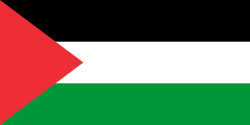| Palestine at the Paralympics | |
|---|---|
 | |
| IPC code | PLE |
| NPC | Palestinian Paralympic Committee |
| Medals Ranked 116th |
|
| Summer appearances | |
The State of Palestine compete as Palestine at the Paralympic Games. Their first participation came at the Sydney Paralympics in 2000, where Husam Azzam won bronze in the shot put event. Palestinian athletes have won three Paralympic medals to date: a silver and two bronze. [1]